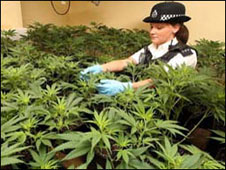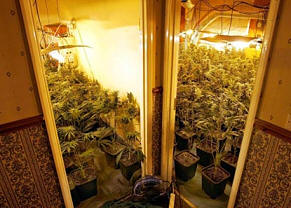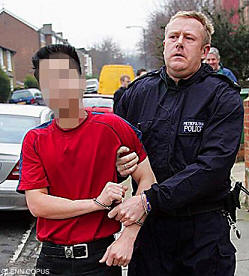 Tờ Evening Standard, báo ra buổi chiều đông độc giả tại London viết về tội phạm người Việt thống lĩnh nghề trồng cần sa lậu tại Anh và nói các băng dân Anh gốc cũng vào cuộc trong cuộc chiến ma tuý tàn khốc.
Tờ Evening Standard, báo ra buổi chiều đông độc giả tại London viết về tội phạm người Việt thống lĩnh nghề trồng cần sa lậu tại Anh và nói các băng dân Anh gốc cũng vào cuộc trong cuộc chiến ma tuý tàn khốc.
Bài của tác giả Tony Thompson hôm 2/9 bắt đầu bằng vụ hai người Việt Nam đi giao một lượng cần sa trị giá 30.000 bảng Anh (khoảng 45.000 đô la Mỹ) tại một bãi đỗ xe ở Sutton, nằm ở vùng Tây London và bị cướp toàn bộ số hàng mang theo.
Khi hai người này, Khach Nguyen và Phac Tran, trở về cơ sở ở Hackney tại Đông London, họ bị người đứng đầu băng đảng, Hoc Kim Khoa, cho rằng đã dựng lên vụ cướp để lấy tiền.
Khach Nguyen và Phac Tran bị đưa đến một trang trại hẻo lánh ở Surrey, Tây London và ông Khach đã bị tra tấn trong vài giờ cho tới chết.
Bài báo nói người cuối cùng trong nhóm sáu người bị tố cáo giết chết ông Khach đã bị tòa án Anh kết án tù chung thân.Nhà báo Tony Thompson nói lợi nhuận thu được từ các vụ cần sa trồng trong nhà ở mức từ 200.000 tới 500.000 bảng Anh một năm.
Tội phạm có tổ chức người Việt được cho là gần như thống lĩnh toàn bộ thị trường trồng cần sa và sử dụng công nghệ thắp sáng, tưới nước và quạt thông hơi được đưa tới từ Canada, nơi các tội phạm người Việt bắt đầu sử dụng công nghệ này.
Các tội phạm người Việt thường bán cần sa cho các băng người Anh để tiêu thụ trên đường phố.
Quá tải
Một báo cáo của cảnh sát Anh được trích dẫn trên Evening Standard nói những người Việt trồng cần sa đã trang bị súng cưa nòng, bình xịt hơi cay, mã tấu và gậy bóng chày để bảo vệ cần sa.
Cảnh sát cũng nói họ tìm thấy các vũ khí ngầm, trong đó có điện thoại có thể gây sốc và cổng được đấu trực tiếp với nguồn điện.
Bài báo trên Evening Standard nói hồi năm 2005, số cần sa trồng tại Anh chỉ chiếm 15% lượng cần sa tiêu thụ trên thị trường.
Sau năm năm, con số này giờ là 90%, chủ yếu do tội phạm người Việt trồng và cung cấp.
Nhưng tác giả Tony Thompson cũng nói các băng nhóm của Anh nay đã thấy được lợi nhuận to lớn từ trồng cần sa và cũng lấn vào lĩnh vực này.
Có những tay trồng cần sa người Anh da trắng nay không chỉ tự trồng mà còn cộng tác với người Việt để làm ăn.
Nhưng giữa hai loại băng đảng này cũng có cạnh tranh, gây đến các vụ đâm chém nhau.
Nhìn chung, tội phạm người Việt hiện vẫn chiếm số đông trong các vụ án liên quan tới trồng cần sa mà báo chí Anh nói tòa án Anh bị quá tải vì số vụ quá nhiều.
Thống kê trên Evening Standard cho thấy trong năm 2007, cảnh sát Anh phá được gần 380 vụ trồng cần sa trong khi con số này của năm ngoái là hơn 690 vụ.
Hệ thống luật pháp Anh cũng từng bị chỉ trích vì đưa ra mức án quá nhẹ đối với tội trồng cần sa, thông thường chỉ là án tù vài năm.
Những người bị bắt vì trồng cần sa không vì mục đích thương mại có thể chỉ bị án treo hoặc phạt lao động công ích.
Nguồn: BBC
Untold profits fuel the violent gang world of London’s cannabis farms

They’ll leave the curtains open, the TV on. It’s all about giving the impression that this is a normal family home’
It seemed like the perfect crime. A south London street gang arranged to buy £30,000 worth of high-quality skunk cannabis from a team of Vietnamese growers that operated several successful “farms” across London and the south-east. The deal was set to take place in a car park close to McDonald’s in Sutton, but instead of money, the gang produced hand guns and stole the drugs, safe in the knowledge that their victims, Khach Nguyen and Phac Tran, could never report the incident to the police.
When Nguyen and Tran returned to their Hackney base and told their boss, Hoc Kim Khoa, what had happened, he accused them of faking the robbery and demanded they repay the money. When they refused, the pair were kidnapped and taken to a remote farm in Surrey where, over the space of several hours, Nguyen was slowly beaten to death.
The gangs concentrate on cultivating strains that grow quickly and produce a more powerful high to give them a product that carries more bangs per buck and can therefore command a higher price. (An “eighth” of skunk — cannabis users have yet to go metric — retails on the street for between £20 and £25, though discounts are available for bulk buyers.) There are no transportation costs, no border controls to evade, and an eager customer base literally right outside the door of each operation — cannabis is by far the most popular and widely consumed illegal drug in the UK.

Sophisticated: a professionally lit and irrigated cannabis farm in Woolwich
Suburban scene: doors open from the landing of a normal home onto bedrooms filled with cannabis pot plants
Set-up costs for a typical operation seemed to vary between £15,000 and £50,000 while annual profits on a single “grow house” run from £200,000 to £500,000. The crops are typically harvested up to four times a year. Special teams arrive at the factories, pull up all the plants and carry them away in laundry bags by dark to other premises where they are dried and bagged up. The Vietnamese gangs will normally sell in bulk to British gangs rather than getting directly involved in street dealing, where the risks of being caught are far higher.
An ACPO report released last month found illicit cannabis factory farmers are arming themselves with sawn-off shotguns, CS sprays and machetes and baseball bats to protect their crops from rival gangs. Police also found hidden weapons, such as a mobile phone fitted with electrodes on the top to shock anyone touched with it, and external booby traps, including one factory gate which had been wired directly to the mains electricity supply.
Most raids are never reported but those that do come to light show why such precautions are considered necessary. Last November, around a dozen members of another London drugs gang travelled to Northampton after getting a tip-off about a cannabis factory that had been set up in an old bakery building and was said to contain 3,000 plants worth more than £1 million.
Fully aware that booby traps may have been set, the gang proceeded to break into the building via the roof. As they began loading dozens of cannabis plants into a waiting van, they found themselves under attack by three Vietnamese “gardeners” who had been locked inside the building to care for the crop. A brawl broke out and quickly spilled into the street, both sides having armed themselves with metal bars, hammers and meat cleavers. Neighbours overheard the early morning commotion and called the police who arrested the gardeners and two of the gang’s look outs.
Across the capital, when street gangs come into possession of large quantities of herbal cannabis, local police know the most likely source of the drugs is a raid on a farm. Herbal cannabis, as distinct from the resin form of the drug, is made of the flowers and stalks of mature female plants. Seizures of herbal cannabis have increased fourfold in the past decade as popularity of this variety has grown. Over the past five years at least four “gardeners” have been murdered in London as a result of raids by other gangs. Over the same period the very nature of the cannabis on the streets of the capital has changed out of all recognition. In 2005, just 15 per cent of cannabis consumed in the UK was grown here, the balance being smuggled in from abroad, particulaly Amsterdam. Today the proportion of domestically farmed product had inreased to more than 90 per cent. That figure continues to rise.
This dramatic shift is due almost entirely to the arrival in the UK of organised gangs from Vietnam, who rapidly achieved near-total domination of Britain’s marijuana business. The gangs employed a high level of expertise and operated a tried and trusted business model capable of generating vast profits in a short space of time.
The know-how and methodology were imported direct from Vancouver, Canada, where, in the mid-Nineties, Vietnamese gangs took over the cannabis trade previously being run by the Hells Angels. Instead of setting up rural plantations as the biker gangs had done, the Vietnamese focused on turning networks of rented houses in busy residential areas into clandestine grow-ops.
The operations were staggered so that a new crop was ready for harvesting every few weeks. If one house in the network were to be raided, profits from the others would more than cover the loss and it was a simple matter to establish a new farm in a new home. Soon the extended criminal families involved in the trade set their sights on horizons new and identical grow-ops appeared in Australia, Sweden and the UK.
By 2005 the factories were everywhere. In September that year police in Newham shut down 14 of them on a single day and judges at courts south of the river began to complain that they were struggling to tell cases apart as there were so many to deal with.
The gangs began to move out of the capital into suburban areas where police were less familiar with the warning signs, but in recent years they have focused on areas with large numbers of rental properties and transient populations where neighbours are less likely to take an interest in what is going on around them. Those living nearby are stunned when they find out what has gone on under their noses. In 2007, the Met shut 378 factories. Two years later that figure had climbed to 692. Since last April, the Met has already shut down 253 factories.
You’re nicked: police are swamped by the numbers of new home factories
Many of these latest finds are being run by British gangs, eager to cash in on the seemingly insatiable demand for the crop. In February this year police seized a parcel addressed to a flat in Wanstead which had been found to contain thousands of pounds worth of cocaine. When the property was raided, police found it had been turned into a cannabis factory, with 22-year-old Jerome Smith hiding in the loft space.
Similarly, 45-year-old Thomas Thomas, currently serving 16 years for his part in the £40 million Graff jewellery robbery, had converted his own home into a cannabis factory. Police found dozens of cannabis plants growing under heat lamps in an upstairs bedroom of the three-bedroom house.
Like the Coes, many gangs are setting up in industrial buildings and scaling back some of their domestic operations in order to help them go unnoticed. In the past gangs would try to use every inch of space in a rented house for cultivation, but not now. “They’re getting cleverer,” says Lam — not her real name — who works as a translator and has assisted in dozens of court cases involving gangs. “They won’t put any plants in the living room, they’ll leave the curtains slightly open and have a television on inside. One even had a Christmas tree. It’s all about giving out the impression that this is just a normal family home, that nothing untoward is going on inside.”
With landlords wary of Vietnamese clients inquiring about large, isolated properties, many gangs welcome the involvement of British criminals in order to help them obtain suitable premises. Cases involving multiple nationalities are already appearing in courts and police expect this trend to continue. It also seems certain that the violence associated with the trade is set to grow.
Tony Thompson
Source: www.thisislondon.co.uk













































One Comment
independent.academia.edu
Hello there, I found your blog via Google at the same time as searching for a
comparable matter, your website came up, it appears to be like good.
I have bookmarked it in my google bookmarks.
Hi there, simply was alert to your blog through Google, and
found that it is truly informative. I’m gonna be careful for brussels.
I will be grateful should you continue this in future.
A lot of other folks will probably be benefited from your writing.
Cheers!
my web site amazonvcc (independent.academia.edu)